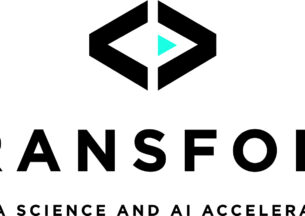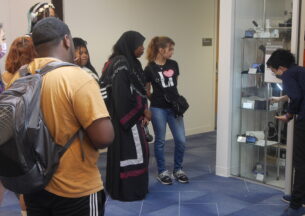UChicago Partners On New National Science Foundation Large-Scale Research Infrastructure For Education
 Researchers from the Department of Computer Science and the Data Science Institute at the University of Chicago have received a $900,000 subaward for their critical contributions to the U.S. National Science Foundation’s (NSF) SafeInsights project. This five-year, $90 million research and development (R&D) initiative aims to build a transformative infrastructure for inclusive education research at a national scale. Led by OpenStax at Rice University, SafeInsights is a large-scale hub that will connect digital learning platforms with educational institutions to enhance our understanding of how students learn best. It represents the NSF’s largest single investment in R&D infrastructure for education and is set to become the first national infrastructure of its kind.
Researchers from the Department of Computer Science and the Data Science Institute at the University of Chicago have received a $900,000 subaward for their critical contributions to the U.S. National Science Foundation’s (NSF) SafeInsights project. This five-year, $90 million research and development (R&D) initiative aims to build a transformative infrastructure for inclusive education research at a national scale. Led by OpenStax at Rice University, SafeInsights is a large-scale hub that will connect digital learning platforms with educational institutions to enhance our understanding of how students learn best. It represents the NSF’s largest single investment in R&D infrastructure for education and is set to become the first national infrastructure of its kind.
Addressing the Gap in Research-Informed Teaching
According to national polls conducted by the Data Quality Campaign, 86% of teachers acknowledge the value of research in improving teaching. However, most educators face significant challenges in accessing high-quality research that can inform their practices, often resorting to piecing together strategies with limited resources.
SafeInsights aims to bridge this gap by studying how students learn in a variety of educational settings, across different subjects, and using diverse learning platforms. The insights generated will drive the development of more effective, research-backed teaching tools and practices, with the goal of promoting greater educational equity and improving outcomes for all students.
“We know research-informed teaching and learning works. Yet, it’s still too hard to conduct large-scale, reliable research and then apply the results for more personalized experiences when students need it most,” said Richard Baraniuk, Rice professor, OpenStax founder, and project lead. “SafeInsights will safely accelerate affordable, rapid-cycle studies across multiple digital learning platforms, leading to more effective tools, practices, and next-level innovations.”
The Role of the University of Chicago in Safeguarding Data and Scaling the Project
While the SafeInsights project has broad national implications, Morton D. Hull Distinguished Service Professor Michael Franklin and Assistant Professor of Computer Science Raul Castro Fernandez from the University of Chicago play a particularly significant role in the development of one of the project’s foundational technologies: the data escrow system. This system is critical to ensuring that student data is used responsibly while still enabling valuable insights to be gathered for educational research.
A cornerstone of the SafeInsights project is its commitment to protecting learner privacy. The system leverages a unique technique called secure data enclaves, which unlocks valuable insights for researchers without exposing any identifiable student information or requiring data to be moved from the learning tools where it is securely stored. This approach ensures that sensitive educational data remains protected while still enabling robust and scalable research.
The team has been working extensively on developing and refining this technology. Their contributions to SafeInsights are centered on building trusted execution environments (TEEs), which provide a way to process and analyze data without compromising student privacy.
“We have worked on building secure data sharing systems before,” ensured Castro Fernandez. “I expect that our experience building those systems can be transferred to the SafeInsights team, which has a top-notch engineering team.”
The team in Chicago has developed a scalable data system that can handle the vast amounts of educational data that SafeInsights will collect from institutions across the country. Early prototypes of the platform are already showing promise, with minimal overhead and quick processing speeds that do not disrupt the user experience. This scalability is crucial as SafeInsights plans to gather data from hundreds of thousands of students over the coming years.
Collaborating to Build a Better Data Infrastructure for Education
Franklin and Castro Fernandez are not only working on the technical aspects of data privacy but are also helping to shape the larger infrastructure that will power the SafeInsights project. By focusing on data flows, cryptographic techniques, and privacy-enhancing technologies, the team is ensuring that the system is both secure and scalable.
UChicago’s contributions are particularly important in light of the fact that SafeInsights aims to be the first national-scale system capable of connecting disparate educational platforms and securely collecting data across institutions. The project’s success hinges on building a reliable and trusted framework for data exchange—something the University of Chicago team is helping to make a reality.
“SafeInsights is trying to build a new data ecosystem– one where we all gain by serving teachers and students better,” said Castro Fernandez. “Building such an ecosystem is difficult, and there are many challenges beyond the technical ones. This project is a perfect scenario for us to bring the expertise we have been developing on building data systems and, more generally, in designing data ecosystems through the research initiative of Data Ecology.”
Looking Ahead: Advancing Educational Equity Through Data
As the SafeInsights project progresses, the University of Chicago’s research team will continue to play an integral role in refining the system’s technical infrastructure, with a focus on ensuring that educational data is used in ways that protect student privacy and promote equity. The goal of SafeInsights is not just to study how students learn but to use those insights to create better educational tools and practices that can help all students thrive.
The impact of SafeInsights, especially with the contributions of UChicago’s researchers, promises to be transformative. The platform’s ability to provide personalized feedback based on data-driven insights will allow educators to better understand student needs and help them succeed in ways that were not possible before. This initiative could help shape the future of education, ensuring that all students, regardless of their background or location, have access to the support they need to succeed.














